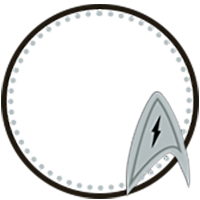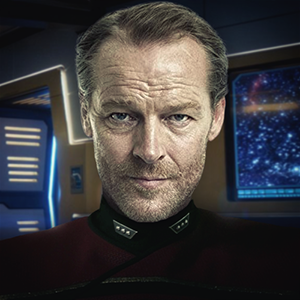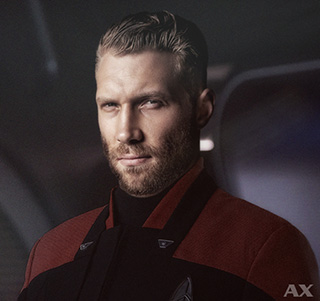Even if he thought about it very hard, Ensign Elegy Weld couldn’t do the math in his head to explain how a one-in-a-century ion storm in the Paulson Nebula had led to a brawl in a coffee shop on Starbase Bravo’s promenade. From deep in the fray, Elegy had seen it happening with his own eyes, and it still baffled him. Elegy had only avoided injury, himself, through the skills of a couple of dedicated security officers. Later on, he would need to solve that equation, because he needed to write several reports on the matter, not least of all because Lieutenant (Junior Grade) Robert Callahan had taken a mug to the head and dropped like a bag of coffee beans.
Guiding Callahan into the secondary hospital ward –without doting too much, to protect the ego of said security officer– Elegy pointed out an empty biobed that was available. Elegy had been watching Callahan’s neurological responses to environmental stimuli through their walk from the promenade, and nothing too alarming had presented itself. As both a psychiatrist, and a medical doctor, Elegy asked Callahan, “Why don’t you tell me everywhere it hurts?”
Callahan eased onto the biobed, gaze rather guarded. Throughout the walk he had seemed uneasy at being accompanied, as if his situation didn’t warrant the fuss and bother of an escort – or like he wanted to give that impression to deflect Elegy’s attention. “You don’t need to stick around on my behalf, Counsellor,” he said, clearly not realising Elegy’s medical training. “I appreciate the thought, but your concern’s unnecessary. It’s just standard to get blows to the head checked out, it’s probably fine.”
“I agree: you’re probably fine,” Elegy replied idly; he sorted through items in an equipment cabinet until he found a medical tricorder. Padding back to the biobed, Elegy held the tricorder down at his side. A little bit sheepish now, Elegy asked of Callahan, “Since it’s only routine, I was hoping you’d let me examine you myself. I’ve just finished medical school and I could use the practice.” Playfully, Elegy rose the tricorder and shook it like a maraca.
The half-smirk that tugged at Callahan’s lips appeared to do so rather against his will. It did, at least, do the job of redirecting power from his shields, and he shifted back to settle more on the biobed. “If you must,” he said, rather more wryly, though kept his eyes on Elegy with a hint of that guarded air remaining. At length, as Elegy worked, he finally ventured, “You think the telepathic influence will have passed by now?”
After syncing the tricorder with the sensors in the biobed, Elegy waved the tricorder in the general vicinity of Callahan’s head. “Your norepinephrine levels are well above baselines, Lieutenant,” Elegy said, sharing the findings from the tricorder readings. As he allowed the tricorder to continue its sensor scans, Elegy tilted his head back, looking up at the overhead. His mind drifted to another mental equation that came much easier than matters of chance and causality. “Given how long ago I treated my patient’s Zanthi Fever, his telepathic projection of emotions should have abated by now.” Looking to Callahan, Elegy spoke in what was supposed to be a reassuring tone, but it all came out a little too theoretical. Elegy offered, “If he caused your spike in norepinephrine, research suggests your ange– I mean, the effects should pass by morning.”
Callahan winced, shifting uncomfortably as he glared at a point on the bulkhead. His jaw worked as he ran through something in his mind, before he at last gave a frustrated sigh. “I don’t suppose,” he said carefully, turning his head to Elegy but not quite looking at him, “you could write that up in your report. In case there’s a complaint about what happened down in Brew. So I can make it clear to the Old Man that these were – you know, extenuating circumstances.” His words did not come easily, the desire to brush quickly past what had happened clashing with apprehension of consequences.
“It was an alarming situation. I thought the Zanthi telepathic effects might be spreading, that more of the crowd might turn on us for trying to settle the brawl,” Elegy said, as he adjusted the settings on the tricorder. Elegy had shared that impression in a consoling fashion, sharing regret and sympathy over Callahan’s outburst to the patrons of Brew, along with a situation that had spun perilous beyond their control. What Elegy said next came out with less sympathy, but there was still no judgment in his tone either. Only acknowledgement. “And what you said was alarming,” Elegy said, naming the emotion he had felt at the time. He met Callahan’s eyes for only a second and then he busied himself, calling up a file on the tricorder’s interface.
Callahan stiffened, his own gaze immediately dropping. “I – I know,” he faltered. “I know it’s unacceptable to make threats like that, especially in a situation like that – that was just regular civilians getting out of hand, and through no fault of their own. I know it’s not how I’ve been trained, I know it’s not how Starfleet should be, how Starfleet Security should be, we’re here to help people…” His voice trailed off, the slightly desperate edge of explaining and condemning himself in one breath running out of steam as Elegy worked and, for long moments, gave him no answer. Somewhat nervously, Callahan’s eyes eventually dragged up to regard him.
Once he found the data he was looking for, Elegy swiped away Callahan’s medical records and he gave the man a determined nod. “Given your baseline charts, I’d say your norepinephrine levels were most likely caused by the Zanthi projections. Your body was reacting as if you were in a warzone, rather than a coffee house brawl,” Elegy affirmed. “That will be in my report.”
With a sigh of relief, Callahan sagged. “Thank you,” he said at last. His gaze again fell on the bulkhead, but now it was with a distant, thoughtful air, rather than the avoidance of earlier, and he began to fiddle with the cuff of his uniform. “I was just so frustrated with them – fighting over petty things when people have lost their homes, their families; lost everything. I knew they were influenced, too, but it felt like they were keeping me from helping with real problems.” He blew his cheeks out and drew a deep breath, and began to rally as he straightened and regarded Elegy. “Anyway, you did a really good job back there, diffusing the situation. Much more use than us security goons, I think.”
“Theoretically,” Elegy remarked, the vowels elongated. Speaking in a self-depreciating tone, Elegy bobbed his head from side to side, and he couldn’t contain a small self-satisfied grin. “I suspect your usual encounters are a little more complicated than spilled coffee. …Still. Thank you for that, Lieutenant,” Elegy said. He took one more look at the biofunction monitor, as he added his notations and sensor logs to Callahan’s patient chart. “I suppose that’s why you joined Starfleet? To solve problems?” Elegy asked.
“To keep people safe,” Callahan said a little simply, then he gave a faint wince, as if realising this was a somewhat trite and superficial answer. His shrug was rather evasive as he pushed on. “I’m from Mars. I’d like to help people like I was helped. I’m not so sure I’ve been doing that patrolling SB-4’s Promenade.” He gave another shrug, this much openness apparently requiring he be as self-effacing as possible, as quickly as possible, and he looked back at Elegy. “What about you? Starfleet Medical Academy’s not something you sign up for lightly.”
Multi-tasking as he finished off his report, Elegy said, “I was programmed from birth to be a Starfleet officer. Starfleet is my whole universe.” He said it whimsically. As he said more, whimsy turned to nostalgia, and nostalgia turned to something quiet and personal. “My mother is a security officer. …Was a security officer. She’s alive, but… Working security for decades, and the dominion war, it changed the way she thought. Changed the lens she looked through. The worst of it hit when I was at the academy, and she’s my mom, you know?” –Elegy’s green eyes stayed on his tricorder, like was afraid to look up, but his gaze was glassy, like he was staring through the tricorder– “Psychology was the only elective that spoke to me. I’d never considered it before. I was going to be an operations manager, but she’s my mom. I wanted to be able to talk to her without feeling… helpless.”
Callahan had stayed quiet as he listened, body language softening, the aura of defensiveness fading as his colleague opened up. “It’s funny,” he mused, in a way which sounded like humour was the last thing on his mind. “This is a calling which drags us all over the galaxy and dozens of light-years from anywhere we call home, but so much of the time it all comes down to family at the end of the day. It’s good of you to think of your mother. We should all be so lucky for our loved ones to keep standing up for us like that.” He sounded approving rather than wistful, understanding rather than strictly jealous.
A little overwhelmed by how vulnerable he felt in that moment, Elegy said, “Thank you, Lieutenant. That means a lot to me.” He was only able to hold eye-contact for a couple of heartbeats before he looked at his tricorder one last time. His medical report complete, Elegy moved to pack away the tricorder. “You’re lucky. There’s no sign of a concussion or other brain injuries. You must have a hard head,” Elegy said, making the easy joke. He looked at Callahan, and he wanted to say something, but he didn’t want to say anything, but he wanted to say something. “Make sure security is what you love,” Elegy spat out. As he continued, his inflection was awkward and halting. “It’s gotta be the only thing you want to do. Security is a… challenging career. What it did to my mother, I wouldn’t want that for you.”
The corners of Callahan’s eyes creased as he listened, and he at last gave a faltering nod. “It is what I love. I mean, I think it is. Maybe I need a shift from patrolling the Promenade all day, try something else. But I – I get you.” He hopped to his feet and straightened up, body language reasserting that veneer of casual, confident control. “Thanks for the check-up, Counsellor. I reckoned it was only a sucker punch; I thought I had that Betelgeusian calmed down and didn’t see it coming. Can’t be too careful, though.” He tapped his temple where he’d been hit, and now he was happy to act like it was definitely no big deal. “I expect you’ve got to get to people who actually need help.”
Taking tentative steps backwards, Elegy winced at the thought of the collection of patients he’d seen in the past few days. Between the grieving mothers and fathers and orphans, it put a furrow in the brow of his shaved head. Hooking a thumb over his shoulder, Elegy supposed, “I should track down where that nurse took my Zanthi patient. You stay safe, Lieutenant. …Maybe stay away from coffee for the next week?”

 Bravo Fleet
Bravo Fleet










